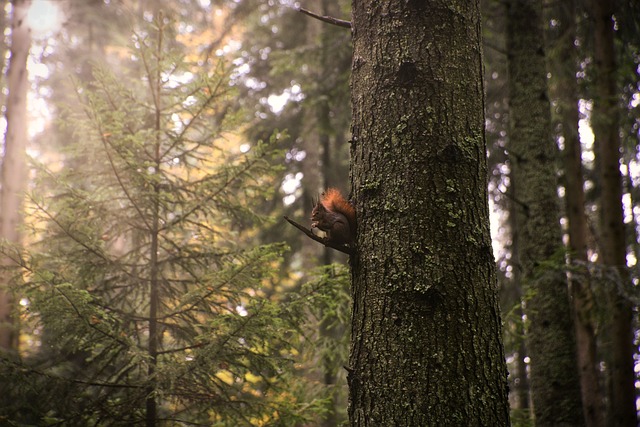In urban areas, squirrels can cause trouble by nesting in homes and gardens. To achieve humane squirrel control, understand their behavior during mating seasons and employ non-toxic natural repellents like mint, cinnamon, garlic, or hot peppers. Strategically place these repellents in problem areas, reapplying after rainfall and seasonally. Combine multiple methods for a comprehensive defense system that keeps squirrels away without harming them. Proactive measures such as regular tree trimming and yard cleanup further deter squirrels, fostering peaceful coexistence with wildlife visitors.
Squirrels can quickly turn from cute visitors into pesky intruders when they start nesting in your home or garden. Understanding their behavior is crucial for implementing effective, humane squirrel control methods. This article explores natural repellents and safe practices to deter squirrels humanely, providing practical tips for creating a squirrel-free zone. From identifying nesting signs to long-term strategies, we cover all you need to know to maintain a peaceful environment without harming these furry friends.
Understanding Squirrel Behavior: Why They Nest and How to Deter Them Humanely
Squirrels are a common sight in many urban and suburban areas, but their presence can sometimes lead to unwanted nest-building activities, especially if they find attractive habitats in our homes or gardens. Understanding squirrel behavior is crucial for implementing humane squirrel control methods. These creatures are known for their agility and dexterity, making them excellent climbers and builders of intricate nests. They typically nest during the spring and summer months, when they prepare for mating seasons and raise their young.
To deter squirrels from nesting in unwanted areas, it’s essential to respect their natural behavior while applying humane techniques. One effective strategy is to make the area less appealing by removing potential food sources and hiding spots. Squirrels are attracted to bird feeders, so securing them properly can be a game-changer. Additionally, trimming trees and shrubs to reduce cover and blocking entry points into homes or sheds can significantly discourage nesting. Using natural repellents like citrus oils or spicy peppers can also help without causing harm to the squirrels.
Exploring Natural Repellents: Safe and Effective Options for Your Home and Garden
Exploring Natural Repellents offers a safe and effective approach to humane squirrel control for your home and garden. Unlike synthetic chemicals, natural repellents are non-toxic and environmentally friendly, making them a preferred choice for those concerned about the impact on wildlife and their surroundings. These repellents often utilize the squirrels’ keen senses of smell and taste, leveraging specific scents or tastes that they naturally avoid. For instance, strong-smelling plants like mint, cinnamon, and garlic can be effective deterrents, as squirrels find these aromas unpleasant.
In your garden, strategically placing these natural repellents near entry points and potential nesting areas can significantly discourage squirrel activity. Additionally, using homemade blends, such as mixing hot peppers with water and spraying it around the property, can create a scent barrier that keeps squirrels at bay without causing them harm. These humane squirrel control methods not only protect your space from unwanted visitors but also promote a harmonious coexistence with these furry creatures in their natural habitat.
Practical Application: Implementing Repellents to Create a Squirrel-Free Zone
When it comes to implementing humane squirrel control, strategic placement of natural repellents is key. Start by identifying areas where squirrels are known to congregate or nest. Common locations include attics, gardens, and tree hollows. Apply repellents like garlic powder, cinnamon, or capsaicin (mildly spicy) to these zones. These substances have a strong scent that squirrels dislike, effectively deterring them without causing harm.
Regular maintenance is crucial for sustaining the effectiveness of these natural barriers. Reapply repellents after rainfall and periodically throughout the year, as squirrel activity can vary seasonally. Combining multiple repellents can create a multi-layered defense, further enhancing their impact. By employing these humane squirrel control methods, you can enjoy a squirrel-free zone that is both environmentally friendly and safe for both your property and the squirrels.
Long-Term Strategies: Maintaining a Humane Squirrel Control Plan for Continuous Protection
Maintaining a long-term, humane squirrel control strategy is essential for continuous protection and ensuring these creatures are treated humanely. One effective approach is to remove potential nesting sites by trimming trees and shrubs regularly, especially near entry points to your home or property. This simple step significantly discourages squirrels from setting up shop, as they prefer the cover of vegetation for easy access and concealment.
Additionally, keeping your yard clean and free of debris creates an environment less attractive to squirrels. Remove any stored woodpiles or brush, as these can provide both shelter and food sources. By implementing these humane squirrel control measures, you create a less inviting space for squirrels to nest, thus reducing the need for repeated intervention and promoting a harmonious coexistence with these curious wildlife inhabitants.
When it comes to humane squirrel control, understanding their behavior and utilizing natural repellents are key. By implementing the strategies outlined in this article—from identifying nesting habits to exploring safe and effective natural options—you can create a squirrel-free zone while maintaining a harmonious relationship with these playful creatures. Long-term success lies in consistent application of these methods, ensuring a peaceful coexistence without resorting to harmful practices.
